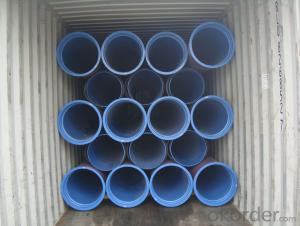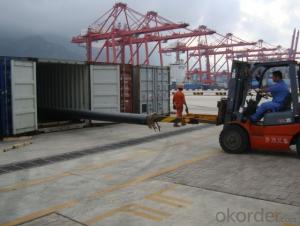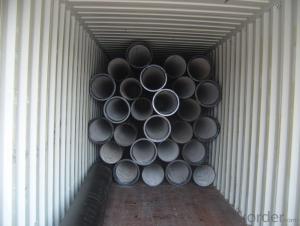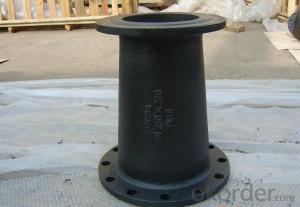Ductile Iron Pipe DN900
OKorder Service Pledge
Quality Product, Order Online Tracking, Timely Delivery
OKorder Financial Service
Credit Rating, Credit Services, Credit Purchasing
You Might Also Like
Specifications
Quick Details
| Place of Origin: | China (Mainland) | Brand Name: | CMAX | Model Number: | T type / K type / Flange type |
| Length: | 6m / 5.7m / Negotiable | Standard: | ISO2531 / EN545 / EN598 | Application: | Potable / Sewage water |
| Diameter: | DN80~DN2200 | Shape: | Round | Hardness: | 230 |
| Pipe Wall Thickness: | standard | Pull Strength: | 420 | Yield (≥ MPa): | 300 |
| Material: | Ductile Iron | Type: | Centrifugal ductile cast iron pipe | Certification: | ISO2531 / EN545 / EN598 |
| Outer Diameter: | 80-2200 | Thickness: | standard | Specification: | DN80~DN2200 |
| |
The advantages to the customer:
Trustworthy financial strength.
One-stop shopping.
Fast and efficient service.
Coordination of shipments from multiple plants.
Specialists of the overseas shipping process.
A more competitive price.
- Q:Can ductile iron pipe be used for trenchless installation methods?
- Yes, ductile iron pipe can be used for trenchless installation methods. Trenchless installation methods, such as horizontal directional drilling (HDD) or pipe bursting, are techniques used to install underground utilities with minimal excavation and disruption to the surrounding environment. Ductile iron pipe is well-suited for these methods due to its inherent strength, durability, and flexibility. It can withstand the forces and stress associated with trenchless installation, including the pulling forces during HDD or the bursting forces during pipe bursting. Additionally, ductile iron pipe's corrosion resistance makes it suitable for applications where the pipe is installed underground without the need for protective coatings. Therefore, ductile iron pipe is a reliable choice for trenchless installation methods.
- Q:How are ductile iron pipes protected against internal scaling or buildup?
- Various methods are utilized to protect ductile iron pipes against internal scaling or buildup. One widely employed technique involves applying a cement mortar lining to the inner surface of the pipes. This lining serves as a protective barrier, preventing the formation of scale or buildup and facilitating the smooth flow of water or other fluids. Moreover, an additional layer of polyethylene or other appropriate materials can be coated onto the pipes to provide an extra level of protection against scaling or buildup. This coating acts as a barrier between the water and the iron surface, thereby reducing the likelihood of corrosion or scale formation. Regular maintenance and cleaning play a crucial role in preventing internal scaling or buildup in ductile iron pipes. By flushing the pipes with high-pressure water or employing chemical treatments, any accumulated scale or debris can be effectively removed, ensuring the pipes remain clean and fully functional. Furthermore, proper water treatment is essential in minimizing the risk of scaling or buildup. By implementing suitable water treatment processes, such as pH adjustment or the use of corrosion inhibitors, the quality of the water can be maintained, preventing the formation of scale or buildup inside the pipes. In conclusion, various measures, including cement mortar lining, pipe coating, regular maintenance, cleaning, and proper water treatment, are employed to protect ductile iron pipes against internal scaling or buildup. These measures ensure the longevity and efficiency of the pipes, minimizing the chances of clogging or reduced flow capacity.
- Q:Are there any special coatings or linings used for ductile iron pipes?
- Yes, there are special coatings and linings used for ductile iron pipes. These coatings are applied to the interior and exterior surfaces of the pipes to protect them from corrosion and extend their lifespan. Common coatings include cement mortar lining, epoxy lining, and polyethylene encasement. These protective layers help prevent the formation of rust and scale, ensuring the durability and longevity of ductile iron pipes.
- Q:Are ductile iron pipes suitable for trenchless installation methods?
- Trenchless installation methods can indeed utilize ductile iron pipes effectively. Renowned for their strength, durability, and flexibility, ductile iron pipes prove to be an excellent choice for techniques like horizontal directional drilling (HDD) and pipe bursting. When employing HDD, a small pilot hole is drilled underground, and the ductile iron pipe is subsequently pulled through this hole, eliminating the need for extensive trenching. The robustness of ductile iron pipes allows them to endure the pulling forces exerted during this process while being effortlessly guided along the underground path. Pipe bursting, on the other hand, is another trenchless method that involves breaking apart an existing pipe while simultaneously pulling a new ductile iron pipe into place. Due to their strength and flexibility, ductile iron pipes can withstand the force required to burst the current pipe, resulting in minimal disruption to the surrounding area. Both these trenchless installation methods offer various advantages when ductile iron pipes are used. These pipes possess a high resistance to corrosion and can endure high-pressure applications, making them suitable for a broad range of underground environments. Moreover, their long service life reduces the need for frequent replacement and maintenance. Ultimately, ductile iron pipes emerge as a dependable and appropriate option for trenchless installation methods, presenting efficient and cost-effective solutions for underground pipe installations.
- Q:What is the expected deflection capability of ductile iron pipes?
- The expected deflection capability of ductile iron pipes is typically quite high compared to other pipe materials. Ductile iron pipes have a flexible nature that allows them to withstand external loads and stresses without breaking or cracking. This flexibility enables the pipes to deflect under pressure, absorbing the force and redistributing it evenly along the pipe's length. The specific deflection capability of ductile iron pipes can vary depending on factors such as pipe diameter, wall thickness, and soil conditions. However, in general, ductile iron pipes can typically deflect up to 2% to 5% of their diameter without causing any significant damage or compromising their structural integrity. This deflection capability allows the pipes to adapt to ground movement, thermal expansion, and other external forces, making them highly resilient and reliable for various applications. It is important to note that the deflection capability of ductile iron pipes should be considered in conjunction with other design criteria, such as the depth of the pipe burial, trench width, and backfill material. Following proper installation practices and adhering to industry standards and specifications will ensure that the expected deflection capability of ductile iron pipes is optimized and maintained throughout their service life.
- Q:What are the typical joint sealing requirements for ductile iron pipes under pressure?
- The typical joint sealing requirements for ductile iron pipes under pressure include the use of rubber gaskets and mechanical joints. These joints are designed to provide a watertight seal and prevent any leakage or seepage of the pressurized fluid. Additionally, proper cleaning and lubrication of the joints before assembly is crucial to ensure a secure and effective seal. Regular inspection and maintenance are also necessary to identify and address any potential joint sealing issues.
- Q:Are ductile iron pipes resistant to chemicals?
- Yes, ductile iron pipes are highly resistant to a wide range of chemicals, making them suitable for various applications involving corrosive substances.
- Q:Can ductile iron pipes be used for railway bridges?
- Yes, ductile iron pipes can be used for railway bridges. They are commonly used in bridge construction due to their high strength, durability, and resistance to corrosion. Additionally, ductile iron pipes can withstand heavy loads and provide excellent structural support, making them suitable for railway bridge applications.
- Q:Can ductile iron pipes be made of flexible waterproof sleeves?
- The casing can be divided into ordinary casing to be 2-4 cm thick than the pipe to be used and fixed to the wall or plate, and the pipe passes through it. Flexible bushing - between the casing and pipe, with flexible material to seal the sealing effect. Rigid casing - that is, between the casing and pipe with rigid material sealed to achieve sealing effect. Waterproof casing - is the use of the casing of the environment is to prevent liquid leakage or leakage into place (such as the pool, septic tanks, basement, etc.) is on the outer wall of the bushing is not less than 1 times increase waterproof wing, this wall is poured in the casing as a whole, not because of swelling shrinkage factor and crack and leakage.
- Q:Are ductile iron pipes suitable for installation in areas with high groundwater salinity?
- Ductile iron pipes are generally suitable for installation in areas with high groundwater salinity. Ductile iron is known for its corrosion resistance, making it a preferred choice for various applications, including water and wastewater systems. High groundwater salinity refers to an increased presence of dissolved salts in the water. While this can potentially cause corrosion in certain materials, ductile iron pipes are designed to withstand such conditions. Ductile iron pipes have a protective lining, typically made of cement mortar or polyurethane, which acts as a barrier between the pipe and the surrounding environment, including high salinity water. The lining helps to prevent any corrosive effects of the high groundwater salinity on the iron pipe, ensuring its long-term durability and reliability. Additionally, ductile iron pipes have a high tensile strength, allowing them to withstand external loads and pressure, even in challenging environments. It is important to note that the suitability of ductile iron pipes for areas with high groundwater salinity can also depend on factors such as the specific levels of salinity, the presence of other corrosive agents, and the overall design and installation practices. Therefore, it is recommended to consult with experts or engineers familiar with the local conditions to determine the most appropriate materials and precautions for specific installation projects.
1. Manufacturer Overview |
|
|---|---|
| Location | |
| Year Established | |
| Annual Output Value | |
| Main Markets | |
| Company Certifications | |
2. Manufacturer Certificates |
|
|---|---|
| a) Certification Name | |
| Range | |
| Reference | |
| Validity Period | |
3. Manufacturer Capability |
|
|---|---|
| a)Trade Capacity | |
| Nearest Port | |
| Export Percentage | |
| No.of Employees in Trade Department | |
| Language Spoken: | |
| b)Factory Information | |
| Factory Size: | |
| No. of Production Lines | |
| Contract Manufacturing | |
| Product Price Range | |
Send your message to us
Ductile Iron Pipe DN900
OKorder Service Pledge
Quality Product, Order Online Tracking, Timely Delivery
OKorder Financial Service
Credit Rating, Credit Services, Credit Purchasing
Similar products
New products
Hot products
Hot Searches
Related keywords




























